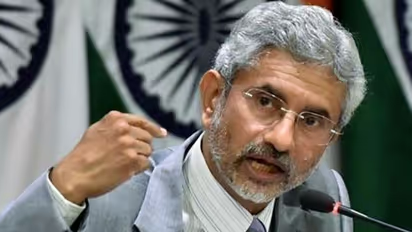Russia-Ukraine crisis has its roots in post-Soviet politics: EAM Jaishankar

Synopsis
The Ukraine crisis deepened further after Russian President Putin announced recognising two breakaway regions of Ukraine as independent states.
Calling the ongoing situation in Ukraine a result of a complex chain of circumstances over the last 30 years, External Affairs Minister S Jaishankar said the situation in Ukraine has its roots in post-Soviet politics, the expansion of NATO and the dynamics between Russia and Europe.
Amid escalating tension between Moscow and the West after Russian President Vladimir Putin recognised two breakaway Ukrainian regions as independent states, in an interactive session at a think-tank in Paris, he said on Tuesday that the world today is in the midst of “multiple crises” and these developments have generated new challenges to the international order.
When asked why India has not condemned the concentration of Russian troops on the Ukrainian borders, the EAM said, “The real question is: are you mobilised to find a good solution or are you content with posturing? India can talk with Russia, with other countries, within the UN Security Council and support initiatives like those of France.”
The Ukraine crisis deepened further after Russian President Putin announced recognising two breakaway regions of Ukraine as independent states.
In his address at the French Institute of International Relations, Jaishankar extensively delved into fast-expanding Indo-French ties and said India looks at France as a “trusted” partner in countering myriad security challenges from the seabed to space and from cyber to oceans.
Also read: Amid Ukraine faceoff, Russian Parliament okays use of armed forces abroad
When asked to compare the Ukraine crisis with the situation in Taiwan, Jaishankar said different problems have different histories, different contexts and players and transposing issues of one theatre to another can be misleading.
“Both are products of very complex histories of that particular region. In the case of Ukraine, a lot of it derives from the post-Soviet politics, the expansion of NATO, the dynamics between Russia and Europe, and Russia and the West broadly,” he said.
“I think, in the case of Taiwan, it is a product of what happened in Chinese history and what happened the way the Cold war and other developments played out in Asia,” he said.
Also read: Russia-Ukraine flare-up: Why Kyiv could be 'the new Berlin'
Also read: Ukraine crisis: Germany halts approval of controversial Russia's Nord Stream 2 pipeline project
Stay updated with the Breaking News Today and Latest News from across India and around the world. Get real-time updates, in-depth analysis, and comprehensive coverage of India News, World News, Indian Defence News, Kerala News, and Karnataka News. From politics to current affairs, follow every major story as it unfolds. Get real-time updates from IMD on major cities weather forecasts, including Rain alerts, Cyclone warnings, and temperature trends. Download the Asianet News Official App from the Android Play Store and iPhone App Store for accurate and timely news updates anytime, anywhere.